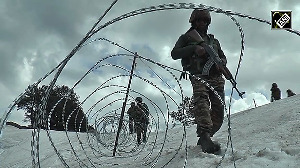Pakistan's main opposition parties appeared completely divided on whether to participate in the January 8 general election or not, with the issue of reinstatement of judges sacked by President Pervez Musharraf turning out to be a major stumbling block.
Hours after Musharraf was sworn in as a civilian president for a second term on Friday, an opposition alliance comprising former premier Nawaz Sharif's Pakistan Muslim League-N and the Jamaat-e-Islami said it will not participate in the polls unless the military ruler reinstated Supreme Court judges sacked under the emergency by December 15.
The All Parties Democratic Movement's call for a boycott was turned down by former prime minister Benazir Bhutto, who said her Pakistan People's Party will participate in the election "under protest".
Bhutto also said she was not convinced a boycott would achieve anything.
Sharif and Bhutto also have not been able to reach common ground on the key issue of the deposed judges of the superior judiciary, including Supreme Court Chief Justice Iftikhar Muhammad Chaudhry.
Sharif has been insistent that the judges should be reinstated and allowed to decide Musharraf's candidature in the presidential poll.
Bhutto, however, has said her party wants an independent judiciary and individuals did not really matter to the Pakistani people, indicating that she will not press for the reinstatement of the judges.
The APDM too is a divided house, with one key member -- Maulana Fazlur Rehman's faction of the Jamiat Ulema-e-Islam -- announcing that it will participate in the polls.
Rehman has said that participating in the polls is the only way to find a way out of the political crisis currently gripping Pakistan.
The APDM has formed two committees one headed by Sharif and another by Jamaat-e-Islami chief Qazi Hussain Ahmed to hold talks with Bhutto and Rehman and convince them to join the boycott.
But observers say the APDM is unlikely to have much success in this initiative.
The APDM's deadline for the reinstatement of the deposed judges coincides with the last date for the withdrawal of nominations.
Political observers say Musharraf's announcement on Thursday that he intends to lift the emergency on December 16 is clearly linked to the APDM's threat of a boycott.
Musharraf on Thursday urged the opposition parties to set aside talk of a boycott and to participate in the election process.
Observers say Musharraf may extend the emergency if Sharif goes ahead with a boycott.
Many insiders believe it will be easier for Bhutto to forge an understanding with Musharraf, with whom she was till recently holding secret parleys on a power-sharing arrangement.
Sharif, on the other hand, has ruled out serving as a prime minister under Musharraf.
Sharif will also face problems in keeping together the APDM, which consists of some 30 members, many of them nationalist parties from North West Frontier Province and Balochistan.
All the constituents, barring Imran Khan's Tehreek-e-Insaf, have filed nominations and are keeping open the option of participating in the polls.
Rehman, who nurses ambitions of playing a greater role in Pakistan's politics, too has reason to participate in polls.
The ruling PML-Q, which is expected to fare poorly, has been making concerted efforts to win him over to its side.







 © 2025
© 2025